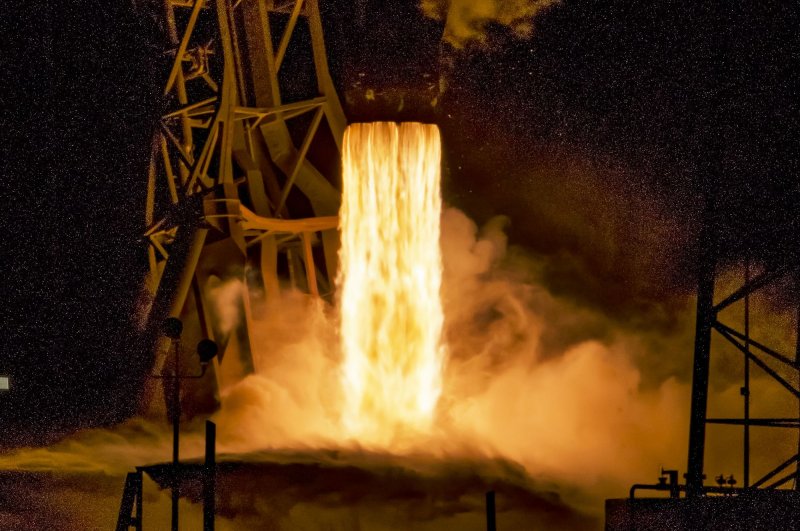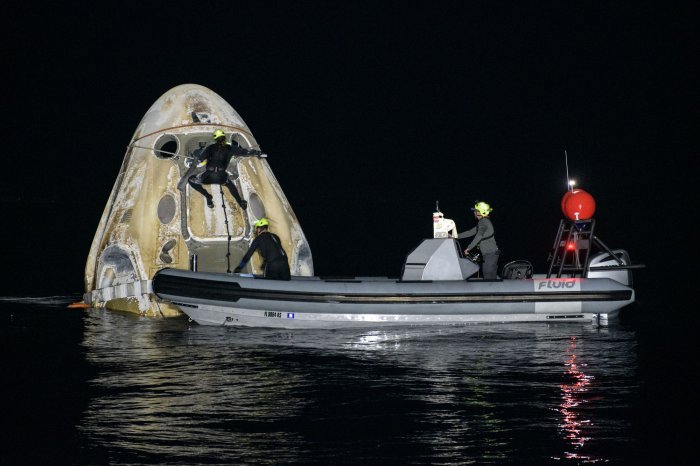1 of 5 | A SpaceX Falcon 9 rocket launches Starlink satellites May 9 from Cape Canaveral Space Force Station in Florida. File Photo by Joe Marino/UPI |
License Photo
ORLANDO, Fla., Sept. 23 (UPI) -- The chair of NASA's independent safety panel blasted Congress on Thursday for not designating a federal agency to spearhead space traffic management.
Chairwoman Patricia Sanders, a former Department of Defense senior executive, said NASA's Safety and Advisory Panel has called on Congress to increase oversight of growing space traffic for years, but to no avail.
"We noted during this week that SpaceX is seeking to launch an additional 30,000 Starlink satellites," Sanders said in a quarterly, virtual meeting of the panel held online Thursday afternoon.
"We have no position on the advisability of that action, but it does underscore our persistent concern with the lack of a formally designated and resourced lead agency for space traffic management."
U.S. Rep. Don Beyer, D-Va., chairman of the House Space and Aeronautics Subcommittee, said late Thursday that he and others in Congress are working on the issue.
"They're right that this has to be done quickly because we're going to see a lot more traffic soon," Beyer told UPI. "We are scheduled take this up in October, and the hope is that we will have a bill by the end of the year."
Space traffic has grown with more frequent launches in the past few years, but the government's regulation of such traffic has been slow to change.
The Federal Aviation Administration oversees licensing and regulation for space launches, while the Federal Communications Commission issues permits for communication satellite networks like SpaceX's Starlink.
The FAA falls under the Department of Transportation, while Congress oversees the FCC directly.
Elon Musk's SpaceX has launched more than 1,600 Starlink broadband satellites and plans to offer regular, global commercial service in October after over a year in testing mode.
British firm OneWeb has about 300 communications satellites in orbit, while Amazon's Kuiper Project also plans to launch thousands of satellites.
Sanders and other observers have said that potential problems include satellite collisions and launch delays if spacecraft are traveling through a launch corridor.
SpaceX has included automatic collision avoidance features, but Sanders and others are not convinced that's enough to address all possible risks.
"This continues to be a critical safety concern, a growing safety concern, that remains unaddressed by the Congress, and it's well overdue to be acted on," Sanders said.
Former NASA Administrator Jim Bridenstine testified at length before a Senate subcommittee last year regarding risks of growing space debris, which has come from a variety of space missions by many nations over the past several decades.
For example, the European Space Agency said in 2019 it moved one of its Earth science satellites to avoid a potential collision with a Starlink satellite, after attempts to communicate with SpaceX failed.
Orbiting debris also poses a problem for space traffic. The space station has fired thrusters many times in recent years to avoid the path of known space debris.
NASA and the Canadian Space Agency discovered in May a small hole from a tiny debris strike on the covering of the space station's robotic Canadarm2. The structure is used to maneuver components and science experiments outside the orbiting laboratory.
Sanders said she and the panel have communicated about the issue regularly with the House and Senate space-related committees, but no formal action or legislation has emerged.
Support teams work around the SpaceX Crew Dragon Resilience spacecraft shortly after it landed with NASA astronauts Mike Hopkins, Shannon Walker and Victor Glover and Japan Aerospace Exploration Agency astronaut Soichi Noguchi aboard in the Gulf of Mexico off Panama City, Fla., on Sunday. Photo by Bill Ingalls/NASA |
License Photo
















